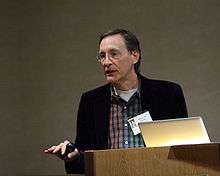
Robert N. Proctor at the History of Science Society, 2009.
Robert Neel Proctor (born 1954) is an American historian of science and Professor of the History of Science at Stanford University.
Quotes
- One topic that has only recently begun to attract attention is the Nazi anti-tobacco movement. Germany had the world's strongest anti-smoking movement in the 1930s and early 1940s, supported by Nazi medical and military leaders worried that tobacco might prove a hazard to the race. Many Nazi leaders were vocal opponents of smoking. Anti-tobacco activists pointed out that whereas Churchill, Stalin, and Roosevelt were all fond of tobacco, the three major fascist leaders of Europe -- Hitler, Mussolini, and Franco -- were all non-smokers
- Robert N. Proctor, "The anti-tobacco campaign of the Nazis: a little known aspect of public health in Germany, 1933-45." BMJ: British Medical Journal 313.7070 (1996): 1450.
- By contrast with diamonds or asbestos or granite or the minerals we burn for fuel, the lowly agate is the victim of scientific disinterest, the same kinds of structured apathy I have elsewhere called 'the social construction of ignorance.' Agates seem to fall outside the orbit of geological knowledge, and therefore tend to be regarded — if at all — as geological accidents or oddities not really deserving systematic study.
- Robert N. Proctor, Agate Eyes: A Lapidary Journey (book-in-progress), cited in: Nancy Marie Brown, "The Agateer: How do agates form?," Penn State News, September 1, 2001
- We live in a golden age of ignorance, and Trump and Brexit are part of that.
- Robert N. Proctor, quotes in: Tim Harford, "The problem with facts," FT Magazine, March 9, 2017
Racial Hygiene: Medicine Under the Nazis, 1988
Robert N. Proctor (1988). Racial hygiene: Medicine under the Nazis. Cambridge, MA: Harvard University Press.
- In early October of 1939, designated by the government as the year of "the duty to be healthy," Hitler authored a secret memo certifying that "Reichsleiter Bouhler and Dr Brandt are hereby commissioned to allow certain specified doctors to grant a mercy death [Gnadentod] to patients judged incurably sick, by critical medical examination."
- p. 177
- In March 1937 the Frankfurter Zeitung reported on the case of a farmer who had shot to death his sleeping son because the child was "mentally ill in a manner that threatened society"
- p. 182
- Nazi philosophers also commonly expressed concerns about cruelty toward animals. In early 1933, Nazi representatives in the Prussian parliament called for legislation banning vivisection.
- p. 277
- It is certainly true that, in one important sense, the Nazis sought to politicize the sciences.
- p. 290
- Yet in an important sense the Nazis might indeed be said to have "depoliticized" science (and many other areas of culture). The Nazis depoliticized science by destroying the possibility of political debate and controversy. Authoritarian science based on the "Fuhrer principle" replaced what had been, in the Weimar period, a vigorous spirit of politicized debate in and around the sciences. The Nazis "depoliticized" problems of vital human interest by reducing these to scientific or medical problems, conceived in the narrow, reductionist sense of these terms. The Nazis depoliticized questions of crime, poverty, and sexual or political deviance by casting them in surgical or otherwise medical (and seemingly apolitical) terms ... politics pursued in the name of science or health provided a powerful weapon in the Nazi ideological arsenal.
- p. 293
Value-free science?: Purity and power in modern knowledge, 1991
Robert N. Proctor, Value-free science?: Purity and power in modern knowledge. Harvard University Press, 1991.
- Neutrality and objectivity are not the same thing. Neutrality refers to whether science takes a stand; objectivity, to whether science merits claims to reliability. The two need not have anything to do with each other. Certain sciences may be completely "objective" — that is, valid — and yet designed to serve certain political interests.
- p. 10
- The appropriate critique of ... sciences is not that they are not "objective" but that they are partial, or narrow, or directed towards ends which one opposes. In general, knowledge is no less objective (that is true, or reliable) being in the service of interests.
- p. 10
- Why do we know what we know and why don't we know what we don't know? What should we know and what shouldn't we know? How might we know differently?
- p. 13
- The rejection of concern for practical goals expressed in the German Society for Sociology's founding charter represented the culmination of a debate in the Social Policy Association, the so-called Werturteilsstreit, in which a group of young political economists, including Ferdinand Tonnies, Werner Sombart, and Max Weber, attacked the older generation of political economists for mixing facts and values, science and politics.
- p. 86
- The case of Otto Neurath, first author of the Vienna Circle's manifesto, is a revealing one. In the years before the First World War, the young Austrian economist became interested in eugenics, translating (with his wife, Anna Schapire-Neurath) Francis Gallon's Hereditary Genius for the first time into German. His most important early work, however, was his analysis of the war economy. War economics, in his view, was a science with well-defined laws and principles which, like ballistics, are "independent of whether one is for or against the use of guns."
- p. 168
External links
This article is issued from
Wikiquote.
The text is licensed under Creative
Commons - Attribution - Sharealike.
Additional terms may apply for the media files.